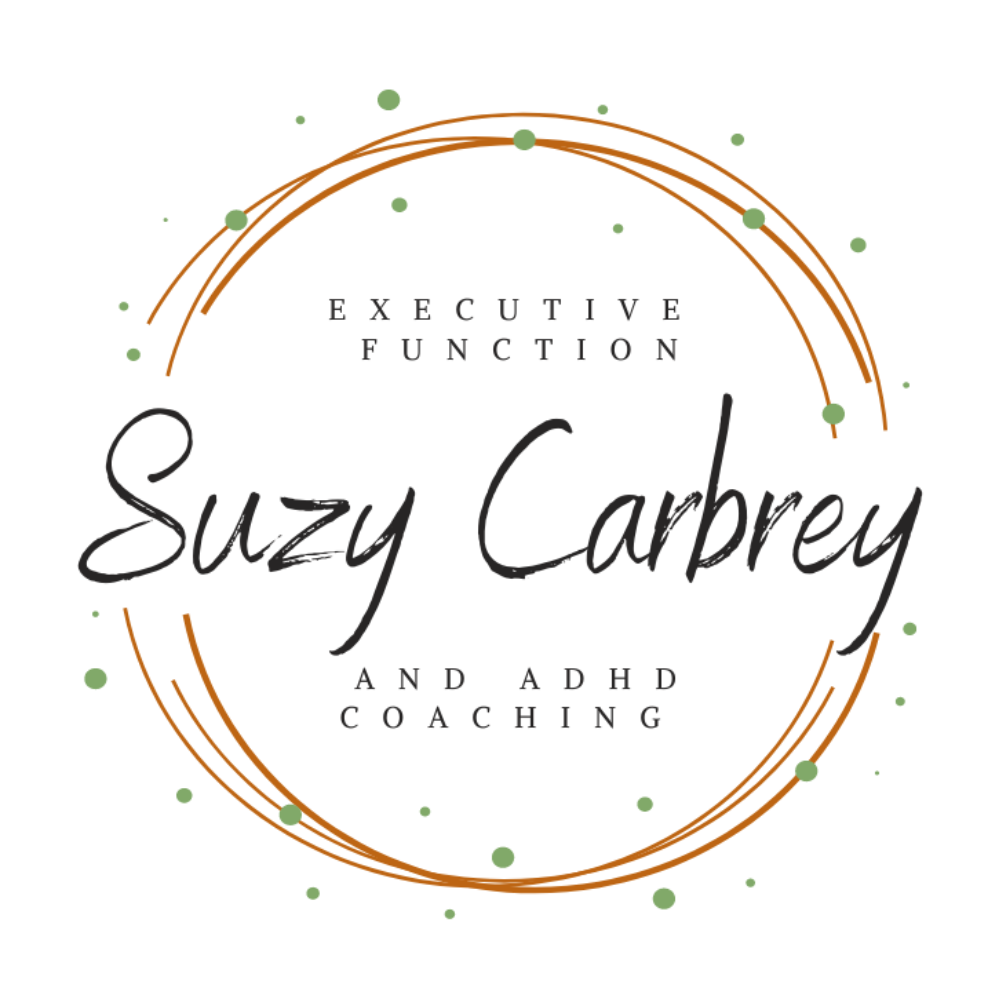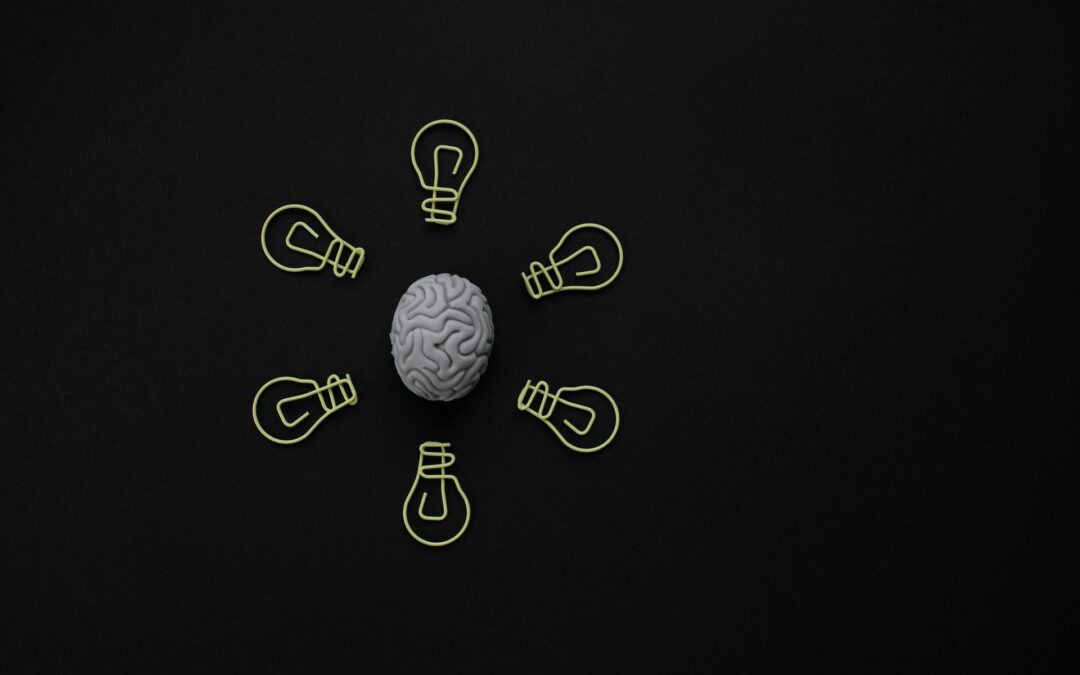Deep Dive Into Executive Functioning
 Executive functioning skills play a crucial role in our daily lives and our success in life. In this blog post, we will delve into the fascinating world of executive functions, highlighting their significance for individuals with ADHD. We will also explore the widely recognized model developed by Peg Dawson and Richard Guare, which serves as a common framework for understanding and addressing executive functioning challenges.
Executive functioning skills play a crucial role in our daily lives and our success in life. In this blog post, we will delve into the fascinating world of executive functions, highlighting their significance for individuals with ADHD. We will also explore the widely recognized model developed by Peg Dawson and Richard Guare, which serves as a common framework for understanding and addressing executive functioning challenges.
What are Executive Functioning Skills?
Executive functioning skills encompass a collection of cognitive processes that assist us in planning, organizing, prioritizing, managing time, regulating emotions, and achieving goals. While there is no single definition, these skills generally involve self-management techniques that enable us to navigate daily tasks effectively.
While executive functioning skills can differ among individuals, individuals with ADHD often face challenges in executive function. ADHD is a neurodevelopmental condition characterized by difficulties in sustaining attention, controlling impulses, and regulating behavior.
Many individuals with ADHD may encounter various aspects of executive functioning difficulties. It is important to note that not all individuals with ADHD will face challenges in all areas of executive functioning. The specific difficulties can vary from person to person, and individuals with ADHD may also exhibit strengths in certain executive functions. Recognizing these challenges and strengths can help individuals with ADHD and those supporting them develop strategies and accommodations to optimize their executive functioning skills.
The Dawson and Guare Model: A Common Framework for Understanding and Exploring the Recognized Model for Executive Functioning
 In this blog post, we will delve into the twelve executive functioning skills identified by Peg Dawson and Richard Guare, experts who have developed a widely used model for understanding and addressing executive functioning challenges.
In this blog post, we will delve into the twelve executive functioning skills identified by Peg Dawson and Richard Guare, experts who have developed a widely used model for understanding and addressing executive functioning challenges.
Their model provides valuable insights into these skills and their significance for personal and professional development. By exploring these skills in-depth, we can gain a better understanding of how they influence our daily lives and learn strategies to enhance our executive functioning abilities. So, let’s dive into the fascinating world of executive functioning skills and discover how they shape our success and well-being.
1. Response Inhibition: When we think before we act, it helps us make better decisions. As adults, this skill shows up when we accept decisions without arguing or when we resist doing something impulsive. It allows us to respond thoughtfully and considerately.
2. Working Memory: Working memory helps us remember things while doing complex tasks. Working memory helps us recall multiple expectations and use our previous knowledge effectively.
3. Emotional Control: Emotional control helps us manage our emotions to achieve our goals. Emotional control helps us bounce back quickly from disappointment and handle anxiety or stress, so we can stay focused and reach our desired outcomes.
4. Sustained Attention: Sustained attention helps us stay focused even when there are distractions or we feel tired or bored. Sustained attention helps us dedicate uninterrupted time to get chores, work assignments, or studying done, making us more productive.
5. Task Initiation: Task initiation is all about starting things without delay. Task initiation helps us begin assignments, chores, or personal projects right away, so we can make progress and achieve success.
6. Planning/Prioritization: Planning and prioritization skills help us create roadmaps to reach our goals and complete tasks effectively. Planning and prioritizing help us settle conflicts, make strategies, and achieve what we want.
7. Organization: Being organized means having systems to keep things in order. Being organized helps us find things easily, manage resources efficiently, and reduce stress.
8. Time Management: Time management is about estimating and using time wisely. Time management helps us finish tasks on time, stick to schedules, and feel accomplished without last-minute stress.
9. Goal-directed Persistence: Goal-directed persistence means staying focused on our goals even when there are challenges or distractions. This helps us overcome obstacles and achieve what we set out to do.
10. Flexibility: Flexibility is all about adjusting our plans when things don’t go as expected. Mental flexibility helps us navigate unexpected changes, accept alternatives, and find creative solutions.
11. Metacognition: Metacognition is about reflecting on our problem-solving skills and making improvements. Metacognition helps us learn from feedback, monitor our performance, and get better by observing others.
12. Stress Tolerance: Stress tolerance means staying strong and positive in stressful situations. This helps us manage stress effectively, adapt to new circumstances, and maintain our well-being.
How Executive Functions Affect Different Areas of Life
Executive functions have a big impact on different parts of our lives. Let’s explore how they influence various areas:
Personal Development: When we have strong executive functions, it helps us grow as individuals. These skills help us set goals, make decisions, and think about ourselves. They show us our strengths, weaknesses, and areas where we can improve, which helps us become better versions of ourselves.
Professional Development: Executive functions are important for our careers too. They help us manage tasks, meet deadlines, stay organized, and work well with others. By developing these skills, we can achieve success in our jobs and have a bright future.
Self-Care: Taking care of ourselves is essential, and executive functions play a role here too. They help us balance our well-being with our responsibilities. With good executive functioning skills, we can take care of ourselves, manage our time, and handle our daily routines effectively. This reduces stress and helps us develop healthy habits.
Parenting: Executive functions are helpful for parents too. They assist parents in organizing family activities, creating routines, disciplining effectively, and supporting their children’s growth. These skills make parents nurturing and structured, helping them guide and take care of their children.
Communication: Having strong executive functions improves our communication skills. They help us listen carefully, organize our thoughts, and respond in the right way. These skills are important for building positive relationships and understanding social cues, which means getting along well with others.
By understanding how executive functions influence different areas of our lives, we can work on improving these skills and lead happier, more successful lives.
Discovering Your ADHD Strengths And Embracing Executive Functioning
 Understanding and developing executive functioning skills can significantly enhance personal and professional success. By embracing these skills, adults can navigate life’s challenges with confidence, improve productivity, and cultivate well-being. Remember that everyone possesses a unique combination of strengths and weaknesses, contributing to the beautiful tapestry of human neurodiversity. Embrace your individuality, harness your strengths, and celebrate the remarkable differences that make each of us special.
Understanding and developing executive functioning skills can significantly enhance personal and professional success. By embracing these skills, adults can navigate life’s challenges with confidence, improve productivity, and cultivate well-being. Remember that everyone possesses a unique combination of strengths and weaknesses, contributing to the beautiful tapestry of human neurodiversity. Embrace your individuality, harness your strengths, and celebrate the remarkable differences that make each of us special.
Discovering Your Strengths and Weaknesses: To get better at executive functioning skills, it’s important to know what you’re good at and where you might need some extra help. Take a moment to think about tasks that come easily to you and ones that are more challenging. This self-awareness will help you know where to focus your efforts.
Supporting Your Weak Skills: If you have weaker executive functions, there are strategies you can use to improve. Creating schedules and using visual aids, like charts or pictures, can make tasks easier to manage. Breaking big tasks into smaller steps can also help. Don’t be afraid to ask for help from others or use technology to assist you. Professionals can give great guidance too!
Optimizing Your Strengths: Everyone has their own special strengths, and it’s important to make the most of them. If you’re really good at something, find ways to use those skills in tasks that challenge you. This way, you can bring your superpowers to the table and find a balance between your strengths and weaknesses.
Everyone has their own special strengths, and it’s important to make the most of them. If you’re really good at something, find ways to use those skills in tasks that challenge you. This way, you can bring your superpowers to the table and find a balance between your strengths and weaknesses.
By discovering your strengths, addressing your weaknesses, and using your special skills, you’ll be on the path to self-improvement and overall success. So, let’s embrace our superpowers and become the best version of ourselves!
Developing Effective Strategies for Executive Functioning Skills
Enhancing our executive functioning skills is essential for managing tasks, making decisions, and achieving our goals. In this section, we will explore practical strategies for each of the executive functioning skills, providing valuable insights on how to improve self-management and thinking abilities.
Response Inhibition: If you want to get better at stopping yourself from doing something impulsive, there are some helpful strategies you can try. First, try to stay away from things that might tempt you to act without thinking. It’s like hiding them or keeping them separate so they’re not right in front of you. Another way is to create a system that reminds you to use self-control. It can be like a signal or a cue that helps you remember to stop and think before doing something. Giving yourself a little reward for resisting a big temptation can also make it easier to stop and think. And if you tell a friend about your goal, they can help you stay on track and remind you when you need to use self-control. These strategies can help you become better at thinking before acting and making smarter choices.
Working Memory: When we have complex tasks to do, creating checklists can be super helpful. They help us stay organized and remember what we need to do. Another great trick is to place visual cues around us, like pictures or notes, that remind us of important things. It’s like having little reminders everywhere we look! And if we have duplicate sets of things we need, like papers or notes, in different places, it lowers the chance of forgetting them. Using apps or technology, like task management apps or reminders on our phones, can also help us keep track of important information. And here’s a cool tip: if we imagine or picture in our minds what we need to remember, it can make our memory even better. So, let’s try these tricks and make our working memory super strong!
Emotional Control: If you want to get better at handling your emotions, there are some cool things you can try. One way is to practice mindfulness meditation, which helps you become more aware of your feelings and learn how to control them. Another trick is to use self-talk, where you talk to yourself in a positive and calming way to manage and redirect your emotions. It’s like giving yourself a pep talk! Whenever possible, it’s also a good idea to avoid situations that make it hard to control your emotions. When you’re feeling upset or stressed, you can use relaxation strategies like taking deep breaths or doing grounding exercises to calm down. And here’s a secret: if you practice in your mind how to handle tough situations that make you feel emotional, it can make you feel more prepared and in control. So, let’s give these strategies a try and become the masters of our own emotions!
Flexibility: Being flexible means being able to adjust to changes and unexpected situations. To be more adaptable, it’s a good idea to plan ahead and think about what might happen. This way, we can be better prepared for surprises. When something unexpected comes up, it’s important to take a moment and give ourselves time to think before reacting. This “wait time” lets us respond thoughtfully instead of impulsively. If we find ourselves in situations that require a lot of flexibility, it can be helpful to avoid them when we can to reduce stress. Sometimes our bodies give us signals when we’re feeling inflexible, like feeling tense or uncomfortable. When we recognize these cues, we can use strategies to help us become more flexible. One way is to create “if-then” plans, which means thinking about different scenarios and deciding how we’ll respond in each one. This gives us a structured way to handle unexpected things. So, let’s practice being flexible and embrace the surprises that come our way!
Task Initiation: Sometimes, it can be hard to get started on tasks, but there are ways to make it easier. One way is to wait to do fun things until after we’ve started or finished our tasks. It helps us stay focused and motivated. Another trick is to keep distractions away. We can put them aside or turn them off so they don’t interrupt us. Breaking tasks into smaller steps also makes them feel less overwhelming. It’s like taking little bites instead of trying to eat a whole sandwich at once! Technology can be helpful too. We can set snooze alarms on our phones to remind us to start our tasks. These tricks can help us get started and stay on track with our work.
Sustained Attention: When we want to stay focused for a long time, there are some cool tricks we can try. One way is to set a “Personal Best” goal, which means trying to beat our own record for how long we can concentrate. It’s like having a challenge for ourselves! To help us stay focused, it’s a good idea to limit distractions. We can block websites that waste our time or make us lose focus. Another trick is to listen to quiet music on an iPod. It helps us screen out unexpected noises that might grab our attention. If we pair tasks we don’t like with something enjoyable or rewarding, it can motivate us to keep paying attention. So, let’s set our “Personal Best” goals, block distractions, listen to calming music, and stay focused on our tasks!
Planning/Prioritizing: When we have lots of things to do, using planning templates can be super helpful. They help us create organized plans for our tasks and goals. Another cool tool we can use is post-it notes. We can write down each step of a task on a separate note and move them around easily if we need to change the order. If we need extra help with planning, we can ask someone who’s good at it for guidance. They can give us valuable advice and tips. And here’s a fun idea: we can practice our planning skills by starting with tasks that we enjoy or find fun. This way, we can gradually get better at planning and become more organized. So, let’s grab our planning templates, and post-it notes, and seek guidance from planning pros to help us stay organized and succeed in our tasks and goals!
Organization: When it’s time to get organized, we can make it enjoyable! We can do it while engaging in activities we like, which creates a positive feeling about organizing. Starting with small tasks helps us avoid feeling overwhelmed. It’s like taking little steps instead of big leaps. Using checklists is also super helpful because we can keep track of what needs to be organized. And guess what? If we team up with someone who’s good at organizing, they can give us great ideas and help us create systems that work well. So, let’s have fun while organizing, start small, use checklists, and collaborate with organization experts to keep things tidy and stress-free!
Time Management: When it comes to managing our time, there are some clever tricks we can try. Making agreements or having rewards with others can help us be punctual and manage our time effectively. It’s like having a special deal or incentive to be on time. Practicing estimating how long tasks will take can make our planning more accurate. It’s like getting better at guessing how much time we need. Setting our watches ahead a little bit can give us extra time as a buffer. It’s like having a secret trick to make sure we’re not late. If we need extra help, we can ask someone to remind us or give us cues to stay on track. And guess what? Smartphones can be really handy for setting alarms and reminders. They can beep or buzz to remind us when it’s time to start or finish something. So, let’s make agreements, practice estimating, set our watches ahead, seek reminders, and use smartphone alarms to become time management experts!
Metacognition: To become better at thinking and learning, there are some smart strategies we can use. One way is to develop a system for looking at our mistakes and learning from them. It’s like having a special way to think about what went wrong and how we can do better next time. Another cool thing we can do is ask others for feedback. They can give us important insights and different ways to look at things. Using problem-solving templates or frameworks can also help us think more effectively. They give us a step-by-step guide to solve problems and make decisions. So, let’s develop our own mistake-learning system, seek feedback from others, and use problem-solving tools to become super thinkers!
Goal-Directed Persistence: When we have goals we want to reach, there are some cool techniques we can try to stay focused and keep going. One way is to use our imagination and think about our goals in a positive way. It’s like daydreaming about how awesome it will feel when we achieve them. Another trick is to make a plan and set intentions for how we will reach our goals. It’s like having a road map that guides us along the way. Visualizing the steps we need to take can also help us stay persistent. It’s like playing a movie in our minds of how we’ll get there. To keep our motivation high, we should identify any obstacles that might get in our way and find ways to overcome them before they happen. And here’s a fun idea: let’s put up visual reminders of our goals, like pictures or words, so we can see them every day. They’ll keep us motivated and remind us why we’re working so hard. So, let’s use mental tricks, make plans, visualize success, overcome obstacles, and keep our eyes on the prize to reach our goals!
Stress Tolerance: When we face stressful situations, there are ways we can handle them better. One way is to create our own plans to manage stress. It’s like having a special toolbox full of strategies to stay calm and handle stressors. Another trick is to avoid or reduce exposure to stressful situations when we can. It’s like choosing not to be around things that make us feel stressed. We can also mentally prepare ourselves for situations we know will be stressful. It’s like getting ready and feeling confident ahead of time. Taking breaks and giving ourselves time to relax and recharge is important too. It’s like having designated recovery time to rest and feel refreshed. So, let’s make our stress-fighting plans, avoid unnecessary stress, mentally prepare, and take time to relax and rejuvenate.
By implementing these strategies, individuals can strengthen their executive functioning skills and experience improved self-management and thinking abilities. Remember that practice and patience are key to progress, and finding the strategies that work best for you is a personal journey of discovery and growth.
Consistency in Strategy Implementation: Sustaining Support for Executive Functioning
To maintain consistency in utilizing strategies for executive functioning support, consider these tips:
- Create a routine: Establishing consistent daily habits supports task management and reduces decision fatigue.
- Set reminders: Utilize alarms, calendars, or digital apps to prompt action and maintain focus.
- Seek accountability: Engage a friend, family member, or coach who can provide gentle reminders and encouragement.
- Celebrate progress: Recognize and celebrate achievements along the way, reinforcing positive habits.
Embracing Imperfection and Celebrating Neurodiversity: The Beauty of Individual Differences
 In a world that often emphasizes conformity and strives for perfection, it’s essential to embrace imperfection and celebrate the remarkable diversity of human minds. Neurodiversity acknowledges that each individual possesses a unique set of strengths and weaknesses, including variances in executive functioning skills. Instead of seeking an elusive ideal of “perfect” executive functioning, we should appreciate and value the beauty of individual differences. It is through these differences that innovative ideas are born, new perspectives are gained, and novel solutions to challenges emerge. Embracing imperfection fosters a culture of inclusivity, where individuals can flourish by leveraging their distinct talents and contributions. By celebrating neurodiversity, we promote a society that cherishes and respects the diversity of human experiences, ultimately enriching our collective understanding and paving the way for a more inclusive and compassionate world.
In a world that often emphasizes conformity and strives for perfection, it’s essential to embrace imperfection and celebrate the remarkable diversity of human minds. Neurodiversity acknowledges that each individual possesses a unique set of strengths and weaknesses, including variances in executive functioning skills. Instead of seeking an elusive ideal of “perfect” executive functioning, we should appreciate and value the beauty of individual differences. It is through these differences that innovative ideas are born, new perspectives are gained, and novel solutions to challenges emerge. Embracing imperfection fosters a culture of inclusivity, where individuals can flourish by leveraging their distinct talents and contributions. By celebrating neurodiversity, we promote a society that cherishes and respects the diversity of human experiences, ultimately enriching our collective understanding and paving the way for a more inclusive and compassionate world.
Unlocking the Power of Executive Functioning: Nurturing Your Potential
Executive functioning skills are the bedrock of personal and professional success. By understanding these skills, discovering our strengths and weaknesses, and implementing strategies to optimize performance, we can navigate life’s challenges with confidence. Remember, nobody is perfect, and that’s okay. Embrace your individuality and celebrate the remarkable diversity of human minds!
Begin Online Coaching for Executive Functioning / ADHD
Ready to gain control and enhance your executive functioning? As an experienced and compassionate coach, I specialize in providing support for executive functioning and ADHD. To embark on your journey, please reach out to me at 708-264-2899 or email hello@suzycarbrey.com to schedule a FREE 20-minute discovery call consultation.
With a background as a speech-language pathologist, I have a strong foundation in executive functioning coaching. My graduate degree program in SLP placed a significant emphasis on cognition, including executive functions, and I have years of experience in medical rehabilitation, providing cognitive-communication therapy. Additionally, I have completed an ADHD Services Provider certification program, I am Solutions-Focused Brief Therapy Diamond Level 1 certified and I am trained in the Seeing My Time® executive functioning curriculum.
Experience the convenience and effectiveness of online coaching, backed by studies that demonstrate equal results to in-person services. Parents, professionals, and emerging adults love the convenience and privacy of receiving coaching from their own homes.
Whether you reside in Chicago, Milwaukee, Indianapolis, Kansas City, or anywhere else around the globe, I am here to assist you. Schedule your discovery call consultation today, and I eagerly anticipate the opportunity to work with you!
Please note that although I am a certified speech-language pathologist, all services Suzy Carbrey LLC provides are strictly coaching and do not involve clinical evaluation or treatment services. If you require a formal speech therapy evaluation and treatment, please inform me, and I can provide appropriate recommendations.

